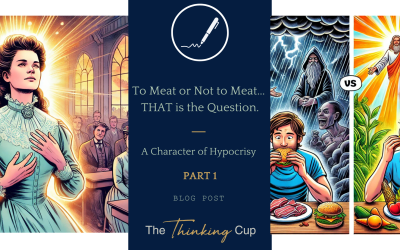How can we be certain of the accuracy of our understanding of the biblical text? While I may not be fluent in Hebrew, Greek, or Aramaic, I place significant trust in the academic work of experts who have dedicated their lives to understanding these ancient Biblical languages. This reliance on scholarly work doesn’t diminish the role of personal faith, but rather enhances it, leading us to a deeper understanding. It’s our critical thinking and intellectual curiosity, guided by the Holy Spirit, that truly bring the text to life. Our personal faith, a vital part of this process, should reassure us of our connection to our beliefs and the Scripture.
I remember being told on several occasions, “Mike, be careful what you read and how much you study… be careful cause you might study yourself out of the church!” While I know these statements came from people who cared deeply about me and my spiritual walk, I didn’t know how to take them. Was there something that I should be afraid of inside the teaching of the Adventist church? Should I never read the works of other “non-Adventist” scholars for fear that their work would influence me to leave Adventism? Why should we fear scholarly influence? After all, being an Adventist isn’t what saves a person… right? Or was that question the crux of the issue? Perhaps it’s time to liberate ourselves from this fear and embrace the diversity of scholarly influence, recognizing its value to our understanding and interpretation of Scripture. This diversity should make us more open-minded and accepting in our spiritual journey, and it should also unite us in our shared exploration and interpretation of our faith.
Does the Adventist framework really believe, as Ellen White stated in the Review and Herald on May 8, 1888,
We need to be constantly on our guard, to watch and pray lest we enter into temptation. The indulgence of spiritual pride, of unholy desires, of evil thoughts, of anything that separates us from an intimate and sacred association with Jesus, imperils our souls. We must have living faith in God. We must “fight the good fight of faith,” if we would “lay hold on eternal life.” We are “kept by the power of God through faith unto salvation.” If the thought of apostasy is grievous to you, and you do not desire to become the enemies of the truth, the accusers of the brethren, then “abhor that which is evil; cleave to that which is good;” and believe in Him who is “able to keep you from falling, and to present you faultless before the presence of his glory with exceeding joy.”[1]
Ellen White was clear: apostasy was becoming the enemy of truth and an accuser of the brethren (SDA Church). Once a person begins to push against Ellen White and the Church, they are slowly being used by the devil and will apostatize! (Or at least that is what Ellen White and, by extension, the undercurrent of the SDA church today stands by.)
And just in case you think I’m making this up, Ellen White wrote the following in Last Day Events, a compilation of Ellen’s thoughts on End Times. (This quote was originally written in the Signs of the Times on April 20th, 1876, 12 years before the previous quote):
It is Satan’s plan to weaken the faith of God’s people in the Testimonies. Next follows skepticism in regard to the vital points of our faith, the pillars of our position, then doubt as to the Holy Scriptures, and then the downward march to perdition. When the Testimonies, which were once believed, are doubted and given up, Satan knows the deceived ones will not stop at this; and he redoubles his efforts till he launches them into open rebellion, which becomes incurable and ends in destruction.[2]
In the case of those who are not so familiar with White’s writings, she often refers to her writings as The Spirit of Prophecy and the Testimonies. Yes, a section of her writings is called The Testimonies for the Church, a nine-volume containing over 4,700 pages of supposedly prophetic counsel to the church. So, while the quote above could be referring only to this section of literary work, the logic still follows. If you turn others away from these works, you are deceived by the devil and on a road to perdition.
So, am I forever damned, marching down a road to perdition because I question Ellen White’s writings? When new scholarship and research prove Ellen White to be contrary to scripture, should I fear her direct condemnation? Or did Ellen White use her written words to drive fear into the minds of those who listened to her? These questions and concerns have plagued me since I started studying the Bible. As I learned from scholars like Dr. Michael Heiser, John Walton, Jason Staples, Klyne Snodgrass, Scott McNight, Tim Mackie, Arnold Fruchtenbaum, Renald Showers, John Sailhamer, Dr. Carmen Imes, Matthew Bates, Dr. Clinton Baldwin, David Burnett, E.J. Lauriston and the list goes on and on… should I be concerned with these scholars, when I read concepts and interpretations that run contrary to Ellen White? After all, they don’t keep the Sabbath, so how could I possibly trust them? They don’t have the truth… right?
I almost verbally laugh as I’m typing these words. I’ve heard Adventist Pastors, Elders, and Scholars state these same thoughts. And now I realize the problem. Thinking is dangerous. Freedom to think on our own and formulate our own ideas is truly the most dangerous weapon for organized religion. Especially an organized religion that requires the person to swallow the ENTIRE framework and system like Adventism.
Many Adventist-held positions are weak and don’t hold up against scrutiny. I know this statement sounds arrogant and self-righteous. I’m not a scholar, and there isn’t anything new under the sun, right? Many others before me have argued similar positions, which have all been refuted by Adventist scholars, right? The Adventist Theological Framework is bulletproof because it has been stamped and approved by the Lord’s Messenger, Ellen G. White, right?
Dr. Clinton Baldwin, who holds his Ph.D. in Religion from Andrews University with his emphasis in New Testament Textual Criticism, a former ordained minister of the SDA church who served over 30 churches in Jamaica, rightly states:
“Sadly, many of our biblical scholars (Adventist Scholars) know these positions very well (Baldwin is referring to positions that are contrary to Adventism and strongly grounded in the Bible) and will admit them in private but will never communicate them in public. Of course, one can understand their silence. Such admittance would mean loss of status, career, power, and influence, not to mention financial security, friends, and maybe family affection.” [3]
So, how do I wade through the vast amount of knowledge from all different walks of life with all kinds of different experiences and expertise?
I’ve learned the importance of ‘rightly dividing’ the word of God. The importance of holding Scripture in high regard. Treating the Bible as the Ancient set of documents that it actually is. So, let’s start with what I feel is one of the most important topics before anyone begins the task of interpreting scripture.
What does it mean when we say the Bible is INSPIRED?
This might seem like a pretty obvious statement, but Bible times were not like today’s! Since the Bible begins with the creation of the world and its inhabitants, we can easily deduce that some time between the creation of the world and the writing of the book of Genesis, the Hebrew alphabet and the ability to write were created. Before this time, we know that oral tradition was influential in the lives of biblical characters.
We also know that writing down important ideas, thoughts, stories, and historical events and then putting them into a collection that is then copied and preserved must have been similar in some ways but very different from what we think of today when someone writes a book.
In considering the entire process—oral tradition, sourcing, gathering, editing, and creating original content—how should we understand inspiration? It’s important to remember that inspiration isn’t a one-time event where God is only occasionally involved. Instead, inspiration is a continuous process. There’s a divine role in guiding and preparing the writers to do what God knew they would, ensuring they were capable, literate, and positioned correctly to accomplish their tasks. This view of inspiration as a God-guided process over time makes sense, while thinking of it as a mystical or trance-like occurrence does not. Understanding this concept of inspiration is crucial, especially when considering how the Old Testament, its individual books, and its doctrinal significance have been copied and transmitted throughout history.
One might wonder why I’m mentioning the idea of ‘inspiration.’ It comes from an honest concern in my own study:
Does something need to be inspired for it to be useful?
Countless discussions and debates around sensitive theological arguments have been halted by a simple, “It’s in the Bible, and the Bible is inspired. That person or scholar, that’s just their opinion, and that isn’t inspired. So….” And off the rails, the conversation goes. These discussions seemed never to get anywhere because people would create ways to never listen to others who might have insight into a better understanding of the text.
Self-fulfilling echo chambers are a real problem inside the church walls!
In the next post, we will dig into the concept of inspiration. What is it? How does our view of inspiration shape our study of the Bible? Could our understanding of inspiration be doing damage to our beliefs and doctrines?
In Christian Love,

[1] The Review and Herald, n.d., 1156.
[2] Ellen Gould White, Last Day Events (Pacific Press Publishing Association, 1992), 178.
[3] Baldwin, The Person of Jesus: God’s Obligatory Sabbath, 15.




0 Comments